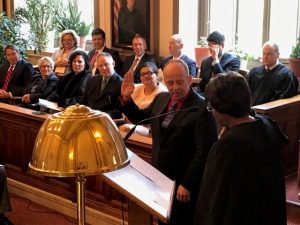As attorneys, especially in a smaller city like Cincinnati, we can be tempted to trust one another, especially experienced real estate practitioners as to the timing of recording of instruments. But that trust can be misplaced, as many times between the “closing” and “recording” things go awry.
Roundtable closings
In Ohio, particularly southwest Ohio and for residential properties, round-table closings are common. For clients from other parts of the country, this can seem like a quaint (and legally dangerous) custom.
The buyer, seller, lender, and Realtors all gather in a room with a title agent to sign and exchange documents and funds. This ceremony is a “closing” and there occurs the formal payment of the purchase price, funding of the loan and the delivery of the deed.
Escrowed closings
This can differ from closings more common in other parts of the country where the seller places in escrow the deed, the buyer places in escrow the note and mortgage and the lender and buyer pay the sums to the escrow agent. (Escrowed closings are not unheard of in the Cincinnati marketplace, especially for commercial transaction or corporate executives whose schedule will not allow them to attend a closing in person.)
In this setting, the title agent holds both the escrowed funds from the buyer and the lender, and the deed and mortgage for recording. Then, he records the instruments and checks the title to assure that “all is clear” before disbursing funds.
The “gap”
Thus, with an escrowed closing, there is no “gap” between funding the recording. The funds are not released until after recording and title updating showing no intervening liens or deeds.
However, with a roundtable closing, the funds are released to the seller at the closing table, and the deed and mortgage may not be recorded for hours or days. In the meantime, in theory if not in practice, a deed, easement, mortgage or involuntary lien (such as a tax lien, a judgment lien or a mechanics lien) could be recorded against the real estate.
Since Ohio is a largely race/notice state as to the order of recordation of instruments (whoever records first without actual notice of someone else’s interest in the property “wins” the contest for priority), the later-recorded deed or mortgage would lose priority to an instrument intervening beforehand.
This is a large potential risk in terms of losing value for the buyer or lender. The total value of the real estate can be lost as a result of such a priority issue.
This timeframe between closing (or the last title update) and the recordation of the title instruments is known in the real estate industry as the “gap.”
Insuring the gap
So, the issue for a buyer should be: Who is taking the risk for the gap? It goes without saying that a seller delivering a warranty deed is promising to deliver good title to the buyer. But what if the seller is a crook, bankrupt, deceased or simply un-findable after the closing?
Well, (a) if a buyer purchases an owner’s policy of title insurance, (b) specifically requests that the title company insure the “gap,” and (c) that “gap” coverage is issued at the closing table, then the buyer will be protected from losses from an intervening instrument. If all three circumstance are not present, then the buyer is going to bear this risk and have claims solely against the seller for breach of warranty covenants.
Real-life experience
We recently were approached by a buyer from a round-table closing on a residential property. It took the title agent six days after the closing to record the deed. In the intervening timeframe, the seller gave a deed to a second buyer. (Sure, this was entirely fraudulent conduct by the seller, but nothing should surprise us anymore.) That second buyer’s deed went on before the deed of the first buyer. The first buyer even purchased an owner’s policy of title insurance, meaning at the closing he obtained a “commitment” for a title insurance policy. But that commitment did not contain “gap” coverage language, rather the policy was conditioned upon the instruments being recorded without loss of priority.
Conclusion
That particular matter is still in litigation, but, win or lose, this story highlights the grave risk of closing a transaction by roundtable closing, and failing to ask for and obtain affirmative “gap” coverage. This admonition applies equally in residential and commercial transactions.
Finally, this ties in with our earlier admonitions: (a) buy title insurance (Why title insurance?) and (b) Don’t just buy a title insurance policy; read the policy, on our Ivy Pointe Title blog. While it would be nice to tell clients that protecting their interest is as simple as buying an owner’s policy of title insurance, it is not. The buyer must read and understand the exceptions to coverage and also ask for “gap” coverage. Otherwise, he retains significant risks of partial or total title failure.







